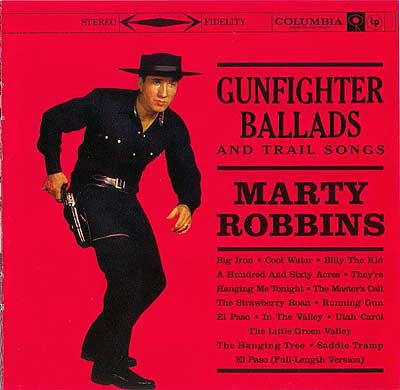I’ve never liked country music, but there’s an old forgotten genre that most people mistake for country, and I like listening to it now and then. It’s mostly old cowboy ballads, from artists like the Sons of the Pioneers, Gene Autry, Tex Ritter…and the western swing of Bob Wills and his Texas Playboys. If I’m writing a western, sometimes these songs help me keep the right mindset.
I call it “western music,” figuring maybe it’s what mixed in with the mama-died-on-Christmas stuff to form “country & western.” However you classify it, I liked it enough to compile a CD, which one family member liked so much, I’ve recently fulfilled a request for another.

You can listen to a song for years, and even sing along with it, without really considering the lyrics. At least I have. Such is the case with “El Paso” by Marty Robbins, a cowboy ballad with beautiful Tex-Mex guitar accompaniment. Only on my last listen did I really think about the story the song tells.
Here’s the gist of it as crooned by Robbins:
A cowboy has a raging case of one-itus for a Mexican bar girl who sounds like an eight or nine. He’s convinced she’s a special snowflake and he’s partially right: she is flaky. Obviously she’s still riding the carousel because one night he catches her all up on the juevos of a “wild young cowboy.”
Our hero confronts the pick up artist in a jealous rage, and the cowboy goes for his gun. But the narrator is quick on the draw and shoots him dead. Now, knowing he’ll be hanged for murder, he makes a run for it, and holes up in the badlands of New Mexico.
But the boy’s got it bad. By “it” I mean codependent disorder or something, ’cause he just can’t bear being separated from Felina any longer (probably haunted by visions of her on the carousel) and rides back for El Paso.
He knows he’s a wanted man, so this decision was stupid enough. But maybe he thinks they might not be looking for him to return. That notion is put to rest when he’s intercepted by a posse shouting and shooting…and yet he keeps riding for the saloon! Clearly he’s delusional or just plumb loco.
One of the posse scores a hit, but he’s just gotta make it to Rose’s Cantina, so he plunges onward into the hail of lead.
Why, you idiot?
Sure enough, somebody in the posse scores a center-mass hit. The bullet goes deep in his chest. The dumbass dies right there outside Rose’s cantina…but at least he gets a kiss goodbye on the cheek from the slut Felina as his soul floats away to the last round-up.
This song was a tremendous hit back in the day, from what I’ve been told. Yech. The Ballad of a Blue Pill Beta is what this should be called.
By 1959 when this song debuted, the cowboy was the icon of American masculinity. Young boys used to play “cowboys & Indians.” Back then about half the programming on TV was made up of westerns. Even inner city black kids with no interest in history and no appreciation for the great outdoors dreamed of playing football for the team with a cowboy as its mascot.
Was this song instrumental in toppling the icon? Did Marty Robbins’ artsy-fartsy ballad push the he-man symbol of rugged individualism off the alpha pinnacle of devil-may-care masculinity and send him tumbling down (with the tumbleweeds) the slippery slope of feminized pop culture, to finally land, decades later, at the foot of Brokeback Mountain?
The hero of this ballad should have nexted Felina and gamed a quality senorita from a nearby hacienda to cook him frijoles and squeeze out little vaqueros while he built his spread into a cattle empire.
Now there’s a ballad worthy of the music, and lyrics worth singing.







 alker
alker The Renegade seduces more women in each novel than some men will in their entire life (women who shout lines like “Oh Deek, my great bull!” during the throes of passion), and Gaston feeds on his scraps without complaint.
The Renegade seduces more women in each novel than some men will in their entire life (women who shout lines like “Oh Deek, my great bull!” during the throes of passion), and Gaston feeds on his scraps without complaint.


 It’s not the highbrow stuff you see touted on some manosphere blogs, though. Dude-lit isn’t for the wine-sipping, chess-playing side of your personality. It’s for the beer-slamming, ball-playing , trash-talking side.
It’s not the highbrow stuff you see touted on some manosphere blogs, though. Dude-lit isn’t for the wine-sipping, chess-playing side of your personality. It’s for the beer-slamming, ball-playing , trash-talking side.